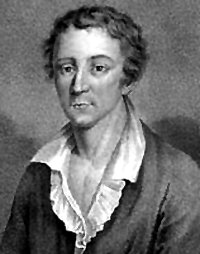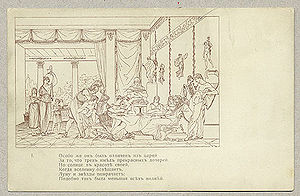
Ippolit Bogdanovich
Encyclopedia

Perevolochna
Perevolochna was a settlement in Kobeljaky Raion of Poltava Oblast of Ukraine close to Svitlohirske. It was situated at the bank of the Dnepr, where a ford enabled people to cross the river...
– January 18, 1803, Kursk
Kursk
Kursk is a city and the administrative center of Kursk Oblast, Russia, located at the confluence of the Kur, Tuskar, and Seym Rivers. The area around Kursk was site of a turning point in the Russian-German struggle during World War II and the site of the largest tank battle in history...
) was a Russia
Russia
Russia or , officially known as both Russia and the Russian Federation , is a country in northern Eurasia. It is a federal semi-presidential republic, comprising 83 federal subjects...
n classicist author of light poetry
Light poetry
Light poetry, or light verse, is poetry that attempts to be humorous. Poems considered "light" are usually brief, and can be on a frivolous or serious subject, and often feature word play, including puns, adventurous rhyme and heavy alliteration...
, best known for his long poem Dushenka (1778).
Biography
Coming from a noble Ukrainian family, Bogdanovich studied in the Moscow University until 1761. His literary career started two years later with editing a literary journal. In 1766, he joined the Russian embassy in DresdenDresden
Dresden is the capital city of the Free State of Saxony in Germany. It is situated in a valley on the River Elbe, near the Czech border. The Dresden conurbation is part of the Saxon Triangle metropolitan area....
as a secretary. Three years later, he was back in Saint Petersburg
Saint Petersburg
Saint Petersburg is a city and a federal subject of Russia located on the Neva River at the head of the Gulf of Finland on the Baltic Sea...
, where he edited the only regular official newspaper, the Vedomosti
Sankt-Peterburgskie Vedomosti
The Vedomosti was the first newspaper printed in Russia. It was established by Peter the Great's ukase dated 16 December 1702. The first issue appeared on 2 January 1703.- Petrine Vedomosti :...
, between 1775 and 1782. In 1788, Bogdanovich was appointed Director of State Archives, a post which he treated as a sinecure
Sinecure
A sinecure means an office that requires or involves little or no responsibility, labour, or active service...
, translating Voltaire
Voltaire
François-Marie Arouet , better known by the pen name Voltaire , was a French Enlightenment writer, historian and philosopher famous for his wit and for his advocacy of civil liberties, including freedom of religion, free trade and separation of church and state...
, Diderot, and Rousseau at loose hours.
It was in 1778 that Bogdanovich brought out his only work of lasting fame, Dushenka. This long poem, resembling a mock epic, was a reworking of La Fontaine's Psyche, a subject originating from Apuleius
Apuleius
Apuleius was a Latin prose writer. He was a Berber, from Madaurus . He studied Platonist philosophy in Athens; travelled to Italy, Asia Minor and Egypt; and was an initiate in several cults or mysteries. The most famous incident in his life was when he was accused of using magic to gain the...
but ingeniously stylized by Bogdanovich as a Russian folk tale. The definitive edition followed in 1783 and instantly became popular for its mildly scurrilous passages. La Fontaine's conventional heroine was presented by Bogdanovich as "a living, modern girl from a gentry family of the middling sort". Following the publication, Bogdanovich was recognized as the foremost Russian practitioner of light poetry
Light poetry
Light poetry, or light verse, is poetry that attempts to be humorous. Poems considered "light" are usually brief, and can be on a frivolous or serious subject, and often feature word play, including puns, adventurous rhyme and heavy alliteration...
and gained admission into the literary circle of Princess Dashkova, while Catherine II of Russia
Catherine II of Russia
Catherine II, also known as Catherine the Great , Empress of Russia, was born in Stettin, Pomerania, Prussia on as Sophie Friederike Auguste von Anhalt-Zerbst-Dornburg...
engaged him to write several comedies for her Hermitage Theatre
Hermitage Theatre
The Hermitage Theatre in Saint Petersburg, Russia is one of five Hermitage buildings lining the Palace Embankment of the Neva River.The palatial theatre was built between 1783 and 1787 at the behest of Catherine the Great to a Palladian design by Giacomo Quarenghi...
.
Assessment

Fyodor Petrovich Tolstoy
Count Fyodor Petrovich Tolstoy was a Russian artist who served as Vice-President of the Imperial Academy of Arts for forty years . His works — wax-reliefs, watercolours, medallions, and silhouettes — are distinguished by a cool detachment and spare and economical classicism.Fyodor Tolstoy came...
's Neoclassical illustrations and citations in Pushkin's works such as Eugene Onegin
Eugene Onegin
Eugene Onegin is a novel in verse written by Alexander Pushkin.It is a classic of Russian literature, and its eponymous protagonist has served as the model for a number of Russian literary heroes . It was published in serial form between 1825 and 1832...
. Indeed, Dushenka was a major influence on young Pushkin, who avidly read the poem during his Lyceum years but later discarded Bogdanovich's verse as immature.
Nabokov
Vladimir Nabokov
Vladimir Vladimirovich Nabokov was a multilingual Russian novelist and short story writer. Nabokov wrote his first nine novels in Russian, then rose to international prominence as a master English prose stylist...
summed up contemporary opinion about Dushenka in the following dictum: "The airiness of its tetrametric passages and its glancing mother-of-pearl wit are foregleams of young Pushkin's art; it is a significant stage in the development of Russian poetry; its naive colloquial melodies also influenced Pushkin's direct predecessors, Karamzin, Batyushkov
Konstantin Batyushkov
Konstantin Nikolayevich Batyushkov was a Russian poet, essayist and translator of the Romantic era.-Biography:The early years of Konstantin Batyushkov's life are difficult to reconstruct...
, and Zhukovski
Vasily Zhukovsky
Vasily Andreyevich Zhukovsky was the foremost Russian poet of the 1810s and a leading figure in Russian literature in the first half of the 19th century...
.

